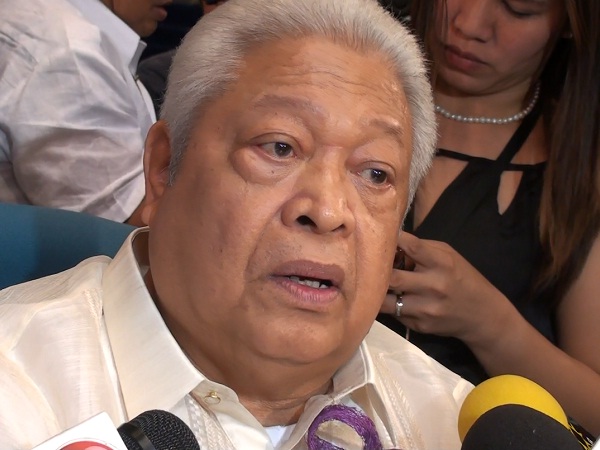Lagman: Why talk about extending martial law without President’s initiative?
Albay Rep. Edcel Lagman, the lead petitioner who assailed President Duterte’s martial law in Mindanao, was baffled why there are discussions in Congress about extending martial law when the chief executive has not even asked for it yet.
In a statement on Monday, Lagman said according to the 1987 Constitution, it should be the President who should have the initiative to ask Congress to extend martial law.
According to Section 18, Article VII of the 1987 Constitution, “Upon the initiative of the President, the Congress may, in the same manner, extend such proclamation or suspension for a period to be determined by the Congress, if the invasion or rebellion shall persist and public safety requires it.”
“Why are some senators and representatives talking about extending martial law in Mindanao when the President has not even officially initiated such extension?” Lagman said.
“Under the Constitution, while an extension needs the concurrence of the absolute majority of the members of the Congress voting in joint session, any such extension shall be upon the initiative of the President,” he added.
Article continues after this advertisementREAD: ‘SC ruling could embolden Duterte to declare nationwide martial law’
Article continues after this advertisement
Lagman made the statement in relation to Speaker Pantaleon Alvarez’ proposal to extend martial law in Mindanao until the end of Duterte’s term in 2022, to enable the government to end the communist insurgency and the threat of the Islamic State-inspired militants in Mindanao.
READ: Speaker pushing for 5 more years of martial law
Lagman said it is only reasonable that “any extension should not exceed the original maximum period of 60 days as provided for in the Constitution.
“The guiding constitutional safeguard is the limited duration of martial law and the suspension of the privilege of the writ of habeas corpus,” Lagman said, referring to the 60-day period allowed for by the Constitution on the imposition of martial law unless Congress votes to extend it.
In a separate statement, Magdalo Rep. Gary Alejano said the extension of martial law would defeat the safeguards in the 1987 Constitution, which were in place to prevent a repeat of the dictatorship of Ferdinand Marcos, who cemented his two-decade regime through martial rule.
“Extending the martial law to 2022, as some have recommended, will practically render the constitutional safeguards useless, which was envisioned by the framers of the 1987 Constitution to avoid the repeat of a Marcos-type martial law,” Alejano said.
Alejano said the administration must justify any extension by first submitting a report to Congress on the need to extend martial law beyond the 60-day period.
“Though I disagree with the extension of martial law, the Executive must be able to report what has occurred and what it has done within the 60-day period of martial law and the reasons or basis why it has to be extended. I believe such report would serve as basis of the duration of any extension of martial law,” Alejano said.
Alejano said extending martial law should also comply with the constitutional requirement of the existence of invasion or rebellion or when the public safety requires it.
Alejano lamented that the country has not learned from its bitter experiences during Marcos’ martial law, which was marred with human rights violations, torture, and enforced disappearances of critics, journalists and activists.
“Bumabalik tayo sa nakaraan at tila hindi tayo natuto sa ating mapait na karanasan sa ilalim ng martial law bilang isang bansa,” Alejano said.
In a separate comment, Ifugao Rep. Teddy Baguilat said the Armed Forces of the Philippines (AFP) should first justify why there is a need to extend martial law.
“Let AFP justify first before the President and then to Congress that martial law is necessary before they ask for extension. Five years? They should think of long term repercussions of extending martial law for five years,” Baguilat said
READ: Makabayan objects to Speaker’s plan to extend martial law
Lagman, Alejano and Baguilat belong to the seven-member independent minority bloc called “Magnificent Seven” who assailed the factual basis of Duterte’s martial law proclamation before the Supreme Court.
But the magistrates found the martial law valid for government to curb the threat of terrorism in the south.
With the allowable 60-day period since Duterte declared martial law on May 23, the proclamation is set to expire on July 23, before Duterte is expected to deliver his second State of the Nation Address (Sona) on July 24.
There were views that the President may ask Congress to extend martial law during his Sona, although the chief executive has said he has no plans of lifting martial law in the Mindanao region unless the military tells him to.
READ: Solon fears Congress may extend martial law on day of Sona
Duterte may even take the opportunity of the joint session during Sona to ask Congress to extend his martial law declaration because there is no prohibition against it, Kabayan Rep. Harry Roque has said.
READ: Duterte urged to ask for martial law extension during Sona
Both Houses of Congress convene to listen to the President’s Sona. According to the 1987 Constitution, Congress voting jointly may decide to extend martial law but only upon the initiative of the President, and if the invasion or rebellion persists and if public safety requires it./ac
READ: No need for Congress to convene once martial law expires — solon
